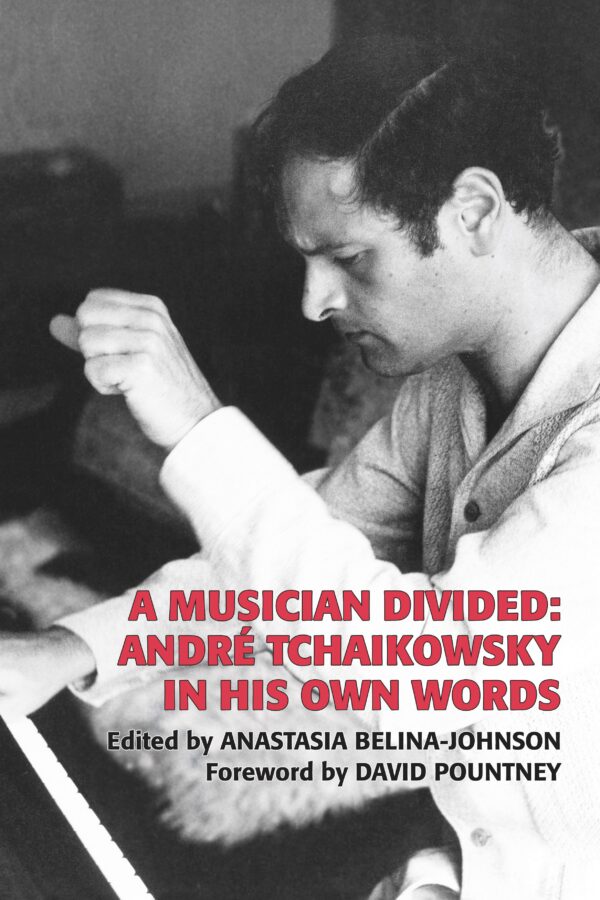A Musician Divided: André Tchaikowsky in his Own Words
Discovery Club Members save even more!
Login or Join Today
Edited by Anastasia Belina-Johnson
Foreword by David Pountney
Extant: 434
Composition: Royal octavo ~ Recordings of André Tchaikowsky's Music ~ André Tchaikowsky's Recordings ~ Index of Tchaikowsky's Music ~ General Index ~ CD of André Tchaikowsky in recital
Illustrations: 72
André Tchaikowsky was only 46 when he died. But his brilliance as a pianist had made him a familiar figure on the world’s concert platforms – and he made the headlines after his death when he left his skull to the Royal Shakespeare Company for use in performances of Hamlet. Yet for all his facility at the keyboard Tchaikowsky’s real passion was composition, and at the time of his death he had all but finished his magnum opus, an opera based on Shakespeare’s The Merchant of Venice. Its premiere at the 2013 Bregenz Festival seems set to bring Tchaikowsky the composer the fame in the 21st century that escaped him in the twentieth.
The internal conflict between pianist and composer compounded an already complex character. A Polish Jew, Tchaikowsky had survived the Holocaust hidden by his grandmother in a Warsaw cupboard, and it was she who gave the young Andrzej Krauthammer the name Tchaikowsky to help fool the Nazis. Already an outsider as a Jew and deeply ambivalent towards his family, Tchaikowsky was also a homosexual – yet another disruptive element in a troubled personality.
The diaries Tchaikowsky kept between 1974 and his death chronicle the struggles that ran through his life. Debt kept driving him back to the concert platform when his true wish was to find the time to compose. Relationships came and went, undermined by his insecurity – although Tchaikowsky generated fierce loyalty among his friends. His spirited writing reveals him to have been astonishingly well read, familiar with the literatures of a number of European languages, and he details the joys and vicissitudes of his life with striking candour.
The diaries – an autobiography in all but name – are introduced and annotated by Anastasia Belina-Johnson, who also provides a chronology of Tchaikowsky’s life and a survey of his music.
A CD – a private recording of an informal recital in Australia – allows the reader to hear the voice behind the words and experience Tchaikowsky’s remarkable musicianship.

David Lasocki :
I met André Tchaikowsky briefly a couple of times in London in the late 1960s, so I was curious to learn more about him. I wasn’t at all prepared for the power of this book. AT was a wonderfully authentic writer in his fourth (?) language. He draws you in every sentence through his intelligence, his strikingly honest opinions on everything and everybody in his life, and the completely open way he comments on his own “divided” life: the schism between performing (to make a living) and composing (his avocation), as well as the shame he gradually learns to release about being Jewish and gay, becoming more able to accept himself for being himself. The biography at the beginning and the section on his compositions at the end are a great bonus. The book is a labour of love. It also makes me keen to dive into the recordings of his compositions. Bravo, Toccata and everyone concerned!
The Classic reviewer :
‘One of the very useful aspects of this book is the use of footnotes at the bottom of page rather than in an appendix at the back of the book making it a joy to read. […]
The book is very well illustrated with numerous black and white photos, facsimiles of scores, documents, letters and diary first page entries. It should appeal to a wide audience, not just those specifically interested in André Tchaikowsky the pianist but for the wider insights into a musician and his times.’
—The Classic reviewer
MusicWeb International :
‘Having several publications to her name, this latest one [by Dr. Anastasia Belina-Johnson]] from Toccata Press is very welcome indeed. […]
All told, this is a very well-researched ‘biography’. The edited diaries, which account for over half the book, I found especially revealing, and I came away from them feeling I had really got under the skin of this fascinating character. Clearly this has been a labour of love for the author, and if her intentions were to reawaken an interest in this almost forgotten musician, she has truly succeeded.’
—Stephen Greenbank, MusicWeb International
Music & Letters :
‘An absorbing read and a significant step in Tchaikowsky studies.’
—Music & Letters
Classical Music :
‘A valuable book in rediscovering a vital talent undeservedly overlooked for too long.’
—Classical Music